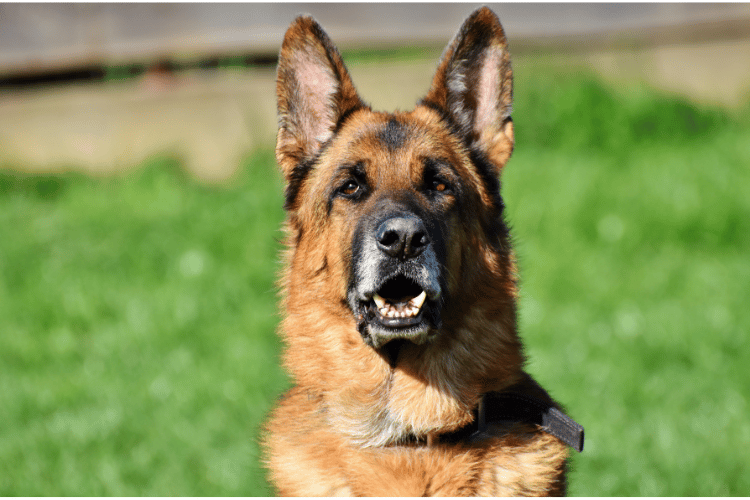It’s a hot summer season and you are enjoying the cool refreshing taste of watermelons. Nothing beats the refreshing taste of an all-ripened and juicy watermelon on a hot day.
You, of course, want to share a piece with a little buddy, but can German shepherds eat watermelon? Should you leave your dog out while enjoying this little treat?
This article will explore the benefits of watermelons for your German shepherds, how to safely feed them to your dog and the possible side effects of excessive consumption.
- Can German Shepherds eat watermelon?
Can German Shepherds eat watermelon?
Yes, German shepherds can eat watermelon since it has numerous benefits for dogs health. Watermelons are rich in potassium and vitamins and an excellent natural fiber source for your dog. They are also low in Sodium, fat and cholesterol making them an ideal treat for your dogs.

Watermelon fruits are an excellent source of vitamins A, C, and E. It is also rich in potassium and magnesium. Watermelon also contains Lycopene, an antioxidant that may help to protect your dog’s heart and brain from damage caused by free radicals.
The watermelon should be peeled before feeding dogs because the skin can contain a natural toxin called melanoidin. The toxin is also found in papayas and mangoes and can cause liver failure or death in dogs if they are consumed in excess.
Benefits Of Watermelon To German Shepherds
Watermelon is a very nutritious fruit and has many health benefits. It may not be the most popular dog fruit but there are countless benefits for your dog if you give them this fruit. A healthy diet and regular exercise routine is key in ensuring a happy and healthy dog.
Here we will talk about the various benefits of watermelon that German Shepherd owners need to know about.
1. Watermelon Is Rich In Potassium
Watermelons are a great source of potassium, which helps to reduce the risk of heart disease. Potassium is a crucial electrolyte in the body that helps to keep your dog healthy and energetic.
It aids muscle contraction regulation and keeps the dog’s heart functioning properly.
Potassium also helps to maintain normal blood pressure levels and supports healthy nerve function, which is essential for your dog’s overall well-being.
You may want to talk with your dog’s vet about a healthy diet that includes more potassium than your dog usually gets from his regular foods. A moderate amount is a great treat to relieve fatigue and tiredness after heavy exercise.
2. Watermelon is Rich in Beta-Carotene
Watermelon is rich in beta-carotene, an antioxidant that helps to keep your dog’s skin healthy. Beta carotene breaks down into Vitamin A molecules which help to produce red blood cells.
Beta-carotene increases eye health and can help to prevent eye diseases such as glaucoma, cataracts and macular degeneration. Beta carotene plays a key role in fighting cancer growth and tumors, likely affecting your dog in old age.
3. Watermelon is Rich in Iron
Watermelon is a good source of iron, which helps the red blood cells to carry oxygen around the body. Watermelon helps to increase the hemoglobin in the blood due to its high nutrients in iron and vitamin C content. Iron deficiency can lead to anemia, which can cause weakness and fatigue in dogs.
4. Watermelon is a Source of Fiber
Watermelon contains a small amount of fiber, which helps to keep digestion moving smoothly through the intestines and aids in preventing constipation or diarrhea. Fiber also promotes healthy digestion by helping to move food through the digestive tract more quickly than if no fiber was present.
5. Great For Dog Hydration
The summer season can cause severe dehydration in your dog. Watermelon consumption can help to prevent overheating and dehydration. Watermelons are actually 92% full of water and work well to keep your German Shepherd hydrated.
6. Watermelons Are Rich in Vitamins
Vitamins play a critical role in promoting metabolic functioning. Watermelons contain a variety of vitamins
- Vitamin B6
Vitamin B6 helps in protein synthesis and aids in the secretion of essential hormones. This vitamin also helps to build a strong immunity system.
- Vitamin A
Vitamin A is critical in maintaining your dog’s vision. It also aids in keeping your dog’s healthy skin, nerve function and reproductive health.
- Vitamin C
Vitamin C is a vital antioxidant in your dog’s health. It helps to fight harmful radicles in the dog’s body and alleviates inflammation. Vitamin C is also in charge of boosting the cognitive functions of your pet.
7. Watermelons Are Rich in Lycopene
Lycopene is a carotenoid pigment, which is also known as beta-carotene. It can be found in different types of foods, such as watermelons, tomatoes, and grapefruit. Lycopene has been studied for its possible benefits to health.
Lycopene has antioxidant properties that are mostly present in pink or red fruits such as watermelons, tomatoes, and grapefruit.
These foods contain large amounts of Lycopene because they are rich in carotenoids such as beta-carotene. These substances help protect against heart disease and cancer.
As German Shepherds are most likely to develop cancer, Lycopene tends to maintain heart health, improve vision, provide protection from sunburns, and prevent certain cancers such as Lung cancer, larynx, and esophagus.
The recommended dosage of Lycopene is 10-15 mg per kg body weight daily for dogs over 5kg body weight; 15-30 mg per kg body weight daily for smaller dogs.
However this can vary depending on the animal’s age and general health condition.
How to Safely Feed Watermelon to Your German Shepherd

Watermelon is a delicious treat for your dog. It is rich in vitamin C, potassium and many other beneficial nutrients to your pet’s health.
However, there are some things that you need to keep in mind when feeding watermelon to your German Shepherd.
1. Remove the Rind
Since watermelon rind is relatively rigid and contains sharp, angular edges when cut, it can present a problem to your dog in terms of swallowing it.
If you want to keep your dog safe while they get their dose of fruit, you need to remove the rind before serving them with watermelon. It’s easy – just cut around the edges of each piece that contains seeds or flesh and discard those pieces. You can also slice off any hard parts like ribs or seeds with a sharp knife or vegetable peeler.
2. Remove the Watermelon Seeds
The seeds of watermelon contain cyanogenic glycosides, which are poisonous to dogs. They also cause gastrointestinal blockage and vomiting in dogs, so it’s best to remove them before offering watermelon to your dog.
3. Consume With Moderation
Watermelon is an excellent option for your German Shepherd to eat. However, like most fruits, it can cause digestive upset if not consumed in moderation. Watermelon is considered low in sodium content due to its lack of salt content but high in carbohydrates.
Dogs with diabetes should avoid treats containing high amounts of carbohydrates like fruit because they could impact blood sugar levels too much if consumed in large quantities.
Are There Any Side Effects From Giving Your German Shepherd Too Much Watermelon?

Watermelon is an excellent treat for your dog, but it can be a problem if you give your dog too much of it.
If you want to give your German Shepherd watermelon, make sure that you use the right amount of watermelon and do not overfeed them.
1. Upset Stomach
Watermelon is high in sugar, which can upset your dog’s stomach if he eats too much at once. If your German Shepherd has eaten too much or vomited within an hour of eating watermelon, he may have an upset stomach and diarrhea.
If you give your dog too much watermelon, it may become bloated and vomit. This is because the excess water in their stomach will come back up as they throw up.
Dogs usually have digestive systems that are very sensitive to changes in diet, so eating too much watermelon can cause problems for them.
2. Blocked Digestive Tract
Giving your German Shepherd too much watermelon can cause a blocked digestive tract in a small percentage of cases. However, this is not common, and most dogs will be fine.
The reason for this is that the watermelon seeds are not easily digestible, and if your dog does not digest the seeds well enough, it may cause a blockage in their digestive tract.
3. Diarrhea
Watermelon seeds are small and can travel through your dog’s digestive tract without being noticed, so there is always a risk that they could be swallowed by mistake.
This could result in diarrhea, which can be very unpleasant. If you identify any of these symptoms in your German Shepherd, immediately take him to the vet for a check-up.
How Much Watermelons Should A German Shepherd Eat In A Day?
In fact, watermelon is the most common fruit consumed by dogs. This fruit contains large amounts of water and sugar, which is the primary energy source for dogs.
If your dog needs to lose weight or gain weight, you should know that the amount and frequency of their food intake are essential factors in deciding how much they will lose or gain weight.
You can use the following guide to see how much watermelon your dog should eat:
1. The Dog’s Age
The older your dog gets, the more calories they need to maintain its health and strength. Adult German Shepherd dogs’ recommended daily calorie intake ranges from 1740 to 2100 calories per day.
2. The Size of Your Dog
Dogs with larger bodies require more food than those with smaller ones because they burn more energy when working or playing.
The recommended daily calorie intake for large breeds like German Shepherds ranges from 1800 to 2000 calories per day; medium-sized species like Labrador Retrievers need at least 1600 calories per day.
Can Watermelon Cause Allergies To German Shepherds?
Watermelon is a favorite summertime treat, but it can also cause allergies to German shepherds. The fruit contains Lectins, a protein linked to causing food allergies and intolerances in dogs.
The most common symptoms include skin rashes, vomiting and diarrhea. These symptoms are similar to those experienced by people who are allergic to certain foods.
Like other allergens, Melon acid is located in the seed coat of watermelon and not in the flesh or rind.
Final Thoughts
Watermelons are safe for German Shepherds to eat in moderation, but be sure to take care of any underlying health issues before letting your German Shepherd have any.
Watermelon is an incredible source of vitamins A and C and potassium. It also contains Lycopene, which has been shown to help protect against cancer.
However, watermelons can also contain high sugar levels and calories, so if you feed your German Shepherd one watermelon every day, it is best to limit their intake.
